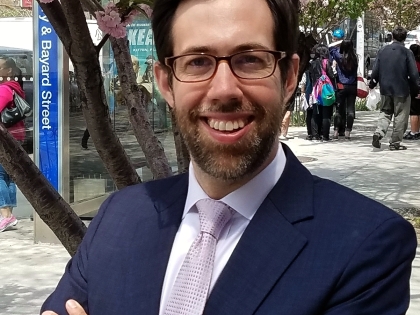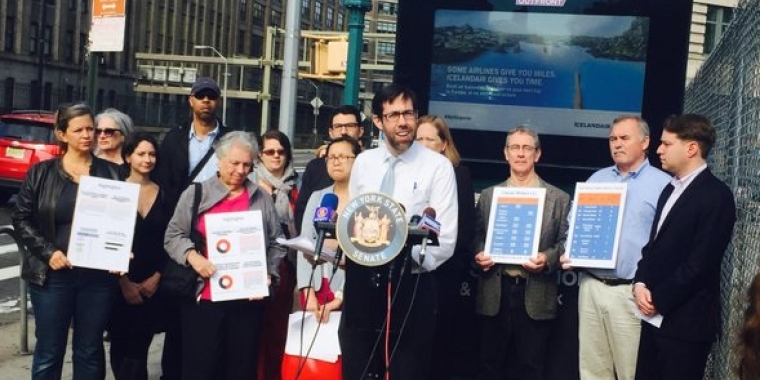
Sen Squadron Announces Worst Subway Stations In District
Zeeshan Ott
October 9, 2015

Squadron, Advocates Call for Fully Funded Capital Plan For Station Repairs
NEW YORK - Today, State Senator Daniel Squadron, Riders Alliance, Straphangers Campaign, Tri-State Transportation Campaign, and Community Leaders announced the results of Squadron's Subway Station Study, conducted throughout Squadron's district in Brooklyn and Manhattan this summer (attached). Squadron’s report surveyed station exteriors and interiors for seven specific "station failures," including: ponding, leaking water, graffiti, broken/damaged stairs, deteriorating walls, rodents, and trash. The study also analyzed elevators and escalators at the 19 stations that have them.
The nine worst stations failed more than half of the 14 station conditions. They were: Canal Street (1); Borough Hall (2/3); Rector Street (R); Broad Street (J/Z); Broadway-Lafayette Street (B/D/F/M); Canal Street (A/C/E); Franklin Street (1); Second Avenue (F); and Wall Street (2/3).
Most stations fared better, exhibiting fewer than half of the 14 possible failures.
In addition, Squadron’s study found:
- Trash accumulation at 70% of stations
- Ponding at 68% of stations.
- Deteriorating walls at 43% of stations
- 60% of the escalators/elevators that were out of service did not have signage indicating both when the escalator/elevator would be back in service & alternative service options
Squadron's report calls for a fully funded capital plan, as well as broader utilization of Full Line Reviews, pioneered by Squadron in partnership with the MTA.
“Surveying all 53 stations in my district showed the good, the bad, and the ugly of our subways,” said State Senator Daniel Squadron. “It’s good that most stations had fewer than half of the surveyed conditions. It's bad that so many of the surveyed conditions we saw are easily fixable. And it’s downright ugly that nine of the stations had more than a 50% failure rate. Hopefully our recommendations can get the bad, and the ugly, to good. I thank Riders Alliance, Straphangers Campaign, Tri-State Transportation Campaign, community members and my colleagues for joining our call today for community engagement and a fully funded capital plan."
John Raskin, Executive Director of the Riders Alliance, said, "The station conditions Senator Squadron has identified are a direct result of decades of underinvestment in public transportation. They are yet another example of why we need a fully funded MTA capital program, so that we have the money we need to repair stations, purchase new subway cars, and upgrade century-old technology. I appreciate Senator Squadron's leadership in advocating for better public transit."
"Stations are a fact of life for every subway rider. We have to go there, often twice a day," said Cate Contino Cowit of the Straphangers Campaign. "Piles of garbage and standing water are uninviting at best. The MTA has worked hard to develop better ways of addressing costly station repairs and has made small gains. It is now up to our elected leaders to come to consensus and fund the capital program. Riders deserve better."
“Subway station rehabilitation projects are a key component of the MTA’s capital program,” said Tri-State Transportation Campaign Communications Coordinator Joseph Cutrufo. “With about 6 million people using them each day, our subway stations are, in many ways, the face of New York City’s transit system, so it is absolutely critical that they are safe and well-maintained.”
“We can’t tackle problems like crumbling walls and ponding in subway stations without the fully funded capital plan we need to rebuild the City’s transit system,” said Paul Steely White, Executive Director of Transportation Alternatives. “We commend Mayor de Blasio for significantly increasing the City’s proposed contribution to the capital program. At the same time, we need assurances from Governor Cuomo that that money the State contributes to the MTA won’t be vulnerable to the regular practice of raiding dedicated transit funds. Our elected leaders must come together and identify equitable and consistent sources of funding to serve future generations of transit riders.”
"Millions of individuals rely on the subway system every day. Senator Squadron's report confirms what many New Yorkers already know - our subway stations are in dire need of repair. I am particularly disheartened by the poor rate of signage regarding elevator and escalator outage, which can be critical for individuals with disabilities. We need a fully funded capital plan to make these improvements so that all New Yorkers can ride the subway safely," said Public Advocate Letitia James.
“The subway is the engine that drives our city, and that’s doubly true in lower Manhattan – so it needs to be safe, clean, and reliable,” said Manhattan Borough President Gale A. Brewer. “The subway may be the single most essential piece of our city’s infrastructure, and its upkeep must be non-negotiable. Every level of government must work together to ensure the MTA Capital Plan is fully funded.”
“It is not surprising that these deplorable conditions exist in our subway stations. It is vital for critical maintenance issues be addressed and I look forward to a resolution of an MTA capital plan so all necessary work to keep our circulatory system flowing can be accomplished,” said Assemblymember Deborah Glick.
Assemblyman Joseph Lentol said, “Everyday, thousands of our constituents use these subway stations. They deserve a well-kept, clean environment. Reducing these problems would mean a huge quality of life improvement for residents in Manhattan and Brooklyn, and I join Senator Squadron in calling for improvements to these conditions.”
“I want to thank Senator Squadron for his persistent call to improve Lower Manhattan’s subway service and stations. Mass transit is the lifeblood of New York, and commuters—especially those with mobility impairments—rely on working escalators and elevators and clear walkways to get to where they need to go every day. These are imperatives for a modern public transit system and minimums of service that must be maintained. Senator Squadron’s study presented today sheds greater light on these important problems,” said Assemblymember Sheldon Silver.
“This study highlights the continued need for increased investment in our public transportation system that tens of thousands of New Yorkers rely upon every single day," said Councilmember Margaret Chin. I thank Sen. Squadron for his commitment to study important issues of subway safety, cleanliness, and accessibility, which affects everyone who lives and commutes into Lower Manhattan.”
“New York City deserves a 21st Century transportation system,” said Council Member Corey Johnson. “As Senator Squadron’s study shows, we have a long way to go. This report illustrates the need to fully fund the MTA Capital Plan. We need to recognize that subway station improvements are critical infrastructure investments that will produce jobs and greatly improve the quality of life for millions of straphangers every day. I would like to thank Senator Daniel Squadron for shedding light on this critical issue.”
“Senator Squadron's report validates the feeling of many downtowners, that our district has some of the worst subway stations in the system: deteriorating, dirty and in urgent need of repair and maintenance. Senator Squadron also provides the solution which is to fully fund the capital plan for the necessary repairs which is good for the commuter, good for New York and good for our air that we all breathe,” said Catherine McVay Hughes, Chair of Manhattan Community Board 1.
“Every New Yorker should be glad to see this focus because NYC subways have so many urgent needs, the stations often get the worst of the neglect. Stations greet riders to the system and our experience there reflects its overall state of management and therefore their condition has great impact on our safety and well-being,” said Tobi Bergman, Chair of Manhattan Community Board 2.
“Much of Community Board 3 is a transportation desert. The limited number of subway stations that we do have should be clean, safe, and accessible. The findings around elevator and escalator access are particularly troubling, given the high number of seniors that rely on public transportation that reside in the Lower East Side. This plan is necessary to ensure the safety and accessibility of our public transportation,” said Gigi Li, Chair of Manhattan Community Board 3.
###
Share this Article or Press Release
Newsroom
Go to NewsroomSandy's Aftermath Resource Page: What to Expect
November 4, 2012
Preparing for Severe Weather: Mandatory Zone A Evacuation
October 28, 2012
RESOURCE PAGE: GENDA AND TRANSGENDER EQUALITY IN NEW YORK
October 23, 2012